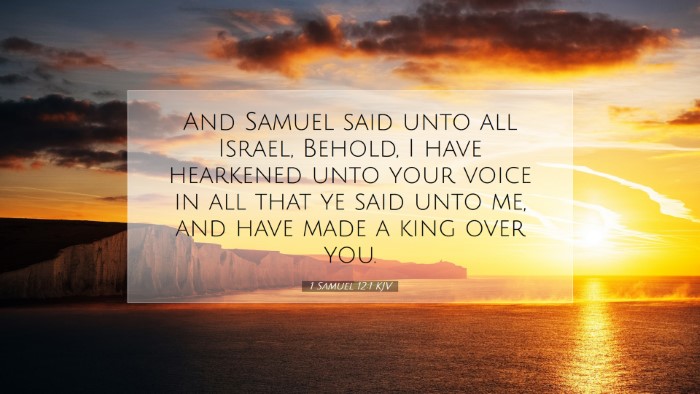Commentary on 1 Samuel 12:1
Verse Context: 1 Samuel 12:1 states, "And Samuel said unto all Israel, Behold, I have hearkened unto your voice in all that ye said unto me, and have made a king over you." This verse marks a significant transitional moment in Israel's history, where the demand for a monarchy is formally acknowledged and implemented.
Introduction
This commentary draws from the insights of notable public domain theologians, including Matthew Henry, Albert Barnes, and Adam Clarke. Together, they provide a rich tapestry of understanding regarding the implications of the Israelites' request for a king and Samuel's response to this demand.
Samuel’s Address to Israel
Samuel’s reply to Israel is a critical reflection of the prophetic role in societal governance. As Henry notes, Samuel emphasizes accountability: he has listened to the people. This shows Samuel's willingness to serve as a mediator between God and His people, but also highlights the tension between divine authority and human desire.
1. Acknowledgment of the People’s Request
In Samuel’s declaration, he acknowledges the people's voice, highlighting their insistence on a king. Barnes explains that this demand signifies the rejection of God’s direct rule over them, as they desire to be like other nations. The correlation between divine governance and human kingship is complex and suggests a deeper theological discourse on submission to God versus human authority.
2. Samuel’s Integrity
Another critical aspect of this verse is Samuel’s integrity. He states, "I have made a king over you." Clarke points out that this encompasses both God's command and Samuel's prophetic function in realizing Israel's monarchy. Samuel, therefore, does not shy away from his role; he embraces it while maintaining a heart of service to God and the people.
3. The Theological Implications
The desire for a king illuminates Israel's spiritual state; as noted by Henry, it reflects a lack of trust in God's sovereignty. The request for a monarchy instead of reliance on divine leadership raises significant questions about faith and governance. The transition does not just signify a political change; it represents a shift in spiritual dependency.
The Role of Leaders
Samuel's response illustrates the vital role of leaders in a community shaped by faith. He re-establishes his role as a prophet and leader who has acted upon the people's desires, thus choosing the path toward a human king while affirming God’s involvement in the process. Barnes emphasizes that leaders must guide their communities by divine standards even when the people may not fully align with these standards.
Clarifying Their Choice
As Samuel prepares to introduce Saul as the chosen king, his declaration serves as a moment of solemn reflection for Israel. He calls the people to recognize the implications of their choice. Clarke remarks that this is not merely a political appointment; it comes with spiritual ramifications. Samuel’s prophetic role is to remind them of their covenant with God.
1. Accountability to God
Samuel emphasizes that despite the appointment of a king, their ultimate accountability remains to God. Henry notes that a king does not absolve the people of their duties before God. The sovereignty of God continues, even when a human monarch is placed over them. This sets a precedent for future generations regarding rulers’ accountability to divine law.
2. Importance of Obedience
Samuel’s speech pivots toward the importance of obedience to God (1 Samuel 12:14-15). He calls the nation to understand that their king should lead them in righteousness, highlighting that true leadership comes from adherence to the will of God. This reinforces the notion that with power comes responsibility.
Conclusion: Lessons for Modern Believers
This passage carries profound lessons for modern pastors, students, theologians, and Bible scholars. The need for divine governance remains relevant in today's world, where human authority often takes precedence over spiritual obligations.
- Trust in God: Believers are reminded to maintain their trust in God’s sovereignty rather than placing their faith solely in human leaders.
- Integrity in Leadership: Leaders are called to be accountable to God and to reflect His will in their decision-making processes.
- Understanding Consequences: Recognizing the implications of choosing earthly authorities versus divine guidance is crucial in spiritual maturation.
- Continued Obedience: Obedience to God is not relinquished with the institution of human governance; rather, it becomes even more pertinent.
In summary, 1 Samuel 12:1 encapsulates a pivotal moment that teaches about the nature of leadership, the importance of accountability to God, and the complexities of faith in governance. These themes are evergreen and continue to resonate deeply with contemporary audiences.


